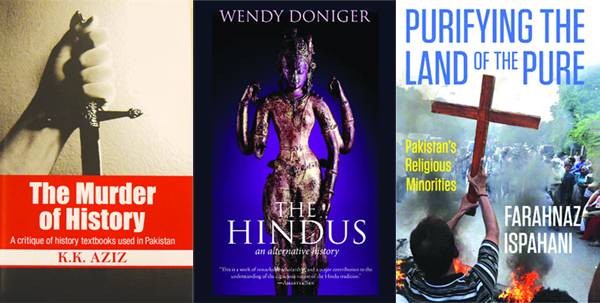
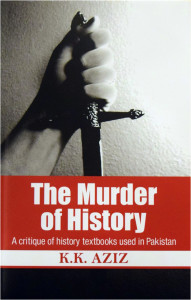
The Murder of History
K.K. Aziz
Vanguard (hardback), 2004
PRs 995
What is being taught as History in Pakistani schools and colleges is really national mythology, and the subjects of Social Studies and Pakistan Studies are nothing but vehicles of political indoctrination. Our children don’t learn History. They are ordered to read a carefully selected collection of falsehoods, fairy tales and plain lies. Why and how has this come about? Who is responsible for this? In what ways is this destroying the social fabric of Pakistan? Why doesn’t anyone protest against it? In this book, a distinguished Pakistani historian and political scientist asks and answers these questions for the first time by making an in-depth study of 66 textbooks on these subjects in use in the schools and colleges of the country. He (1) lists their errors of fact, emphasis and interpretation, (2) enumerates their major omissions, (3) corrects their mistakes, (4) brings out the distortions they teach and perpetuate, (5) estimates their ravaging effects on the students, and (6) measures meticulous care, deep understanding, acute concern, and rare courage.
This is a stinging but fully deserved attack on the governments which order and prescribe these textbooks, the scholars and educationalists who plan and approve them, the professors who write them, and the parents who accept them.
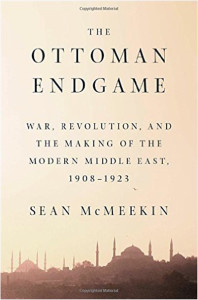
The Ottoman Endgame
Sean McMeekin
Penguin Press (hardcover), 2015
PRs 1995
Between 1911 and 1922, a series of wars would engulf the Ottoman Empire and its successor states, in which the central conflict, of course, is World War I—a story we think we know well. As Sean McMeekin shows us in this revelatory new history of what he calls the “wars of the Ottoman succession,” we know far less than we think. The Ottoman Endgame brings to light the entire strategic narrative that led to an unstable new order in postwar Middle East—much of which is still felt today.
The Ottoman Endgame: War, Revolution, and the Making of the Modern Middle East draws from McMeekin’s years of groundbreaking research in newly opened Ottoman and Russian archives. With great storytelling flair, McMeekin makes new the epic stories we know from the Ottoman front, from Gallipoli to the exploits of Lawrence in Arabia, and introduces a vast range of new stories to Western readers. His accounts of the lead-up to World War I and the Ottoman Empire’s central role in the war itself offers an entirely new and deeper vision of the conflict. Harnessing not only Ottoman and Russian but also British, German, French, American, and Austro-Hungarian sources, the result is a truly pioneering work of scholarship that gives full justice to a multitiered war involving many belligerents.
McMeekin also brilliantly reconceives our inherited Anglo-French understanding of the war’s outcome and the collapse of the empire that followed. The book chronicles the emergence of modern Turkey and the carve-up of the rest of the Ottoman Empire as it has never been told before, offering a new perspective on such issues as the ethno-religious bloodletting and forced population transfers which attended the breakup of empire, the Balfour Declaration, the toppling of the caliphate, and the partition of Iraq and Syria—bringing the contemporary consequences into clear focus.
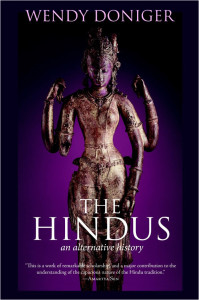
The Hindus: An Alternative History
Wendy Doniger
Speaking Tiger (paperback), 2010
PRs 1595
An engrossing and definitive narrative account of history and myth, The Hindus offers a new way of understanding one of the world’s oldest major religions. Hinduism does not lend itself easily to a strictly chronological account. Many of its central texts cannot be reliably dated within a century; its central tenets arise at particular moments in Indian history and often differ according to gender or caste; and the differences between groups of Hindus far outnumber the commonalities. Yet the greatness of Hinduism lies precisely in many of these idiosyncratic qualities that continues to inspire debate today. This groundbreaking work elucidates the relationship between recorded history and imaginary worlds, the inner life and the social history of Hindus.
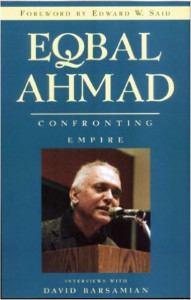
Eqbal Ahmad: Confronting Empire
Interviews by David Barsamian
Vanguard (hardcover), 2003
PRs 795
Edward W. Said once urged the legendary Eqbal Ahmad not to “leave your words scattered to winds, or even recorded on tape, but collected and published in several volumes for everyone to read. Then those who don’t have the privilege of knowing you will know what a truly remarkable, gifted man you are.”
Unfortunately, Ahmad died suddenly before Said’s wish came to fruition. Now, for the first time, Ahmad’s most provocative ideas are available in book form. In these intimate and wide-ranging conversations, Ahmad discusses nationalism, ethnic conflict, the politics of memory, and liberation struggles around the world.
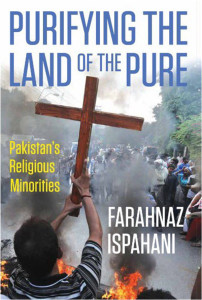
Purifying the Land of the Pure
Farahnaz Ispahani
Harper Collins (hardcover), 2015
PRs 995
An unnerving tale of how politics empowered bigotry in Pakistan’: Asma Jahangir About the book: ‘[Y]ou will find that in course of time Hindus would cease to be Hindus and Muslims would cease to be Muslims, not in the religious sense, because that is the personal faith of each individual, but in the political sense as citizens of the State.’ - Muhammad Ali Jinnah Pakistan was carved out in 1947 to protect the subcontinent’s largest religious minority. It was conceived as a Muslim-majority, albeit secular, State that would set an example for India on how to treat its minorities. But soon after Independence, even as Quaid-e-Azam Jinnah lay dying, political, religious and social leaders proclaimed it an Islamic State, drumming up a national narrative of Islamic victimhood. The result is an ever-intensifying prejudice against religious minorities in an effort to make Pakistan ‘purer’ in ‘Islamic’ terms. Purifying the Land of the Pure is an analysis of the country’s policies towards its religious minority populations, as well as an attempt to set the record straight about why Pakistan was created and where it moved away from Jinnah’s modern pluralist vision to that of a purely Sunni Islamic nation. Farahnaz Ispahani brings to the subject an uncommon combination: the rigour of a scholar and the ground-level experience of a parliamentarian. A crucial addition to the literature on Pakistan.

